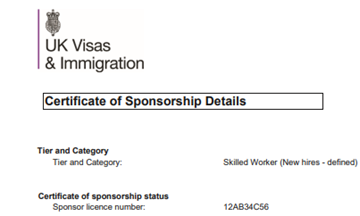UK Hospitality: Bridging Staff Shortages with Visa Options in 2025
Visa Options to Address UK Hospitality Staffing Challenges in 2025

The UK hospitality sector continues to face significant staffing challenges, with resourcing gaps exacerbated by Brexit, the COVID-19 pandemic, the cost of living crisis, increases to National Insurance contributions and stricter immigration rules. To address these issues, the UK government offers several immigration visa options to attract overseas talent.
Here’s an updated guide to the available visa routes for hospitality employers in 2025, along with the latest rules, fees, and insights on effectively utilising these schemes.
Visa Options for the UK Hospitality Sector
Visa Options for the UK Hospitality Sector
1. Skilled Worker Visa
The UK Skilled Worker Visa is a key route for hospitality businesses looking to fill skilled roles. To qualify, candidates must have:
- A job offer from a UK employer with a sponsor licence.
- A role that meets the required skill and salary thresholds.
- Sufficient points under the points-based immigration system are based on factors such as salary, job offer level, and English language proficiency.
Eligibility for Hospitality Roles:
Certain roles in the hospitality sector qualify, including:
- Chefs (excluding fast food roles, with strict skill and salary requirements).
- Bar Managers
- Hotel Managers
- Restaurant Managers
Updated Salary Requirements for 2025:
As of 2025, the minimum salary threshold for Skilled Worker Visa applicants has been adjusted. The following rules apply:
- General Minimum Salary Threshold: £38,700 per year or £18.60 per hour, or the "going rate"
- Reduced Threshold for Specific Applicants: Certain applicants, such as those under 26, new graduates, or working towards recognised qualifications, may qualify for a reduced threshold of £34,600 per year, or a percentage of the "going rate".
Typical Fees
For Employers:
- Sponsor Licence Fee:
- £536 for small/charitable sponsors (valid for 4 years).
- £1,476 for medium/large sponsors (valid for 4 years).
- Certificate of Sponsorship (CoS):
- £199 per CoS issued.
- Immigration Skills Charge (ISC):
- £364 per year per worker for small/charitable sponsors.
- £1,000 per year per worker for medium/large sponsors.
- Priority CoS Allocation Service:
- £200 (if expedited allocation is required).
For Workers (can be paid for by the company):
- Visa Application Fee:
- £719 (up to 3 years).
- £1,420 (over 3 years).
- Immigration Health Surcharge (IHS):
- £1,035 per year for adults.
- £776 per year for dependents under 18.
- English Language Test (if applicable): £150-£200.
- Tuberculosis (TB) Test (if applicable): £50-£100.
2. Youth Mobility Scheme (YMS)
The UK Youth Mobility Scheme (YMS) provides an excellent opportunity to attract young talent from specific countries.
Key Details:
- Open to individuals aged 18-30 (up to 35 for some countries, including New Zealand).
- Allows participants to live and work in the UK for up to 2 years (or 3 years for New Zealand nationals).
- No sponsorship is required, making it a cost-effective option for employers.
- Participating countries include Australia, Canada, Japan, South Korea, New Zealand, and several others.
Typical Fees
For Workers:
- Visa Application Fee: £259.
- Immigration Health Surcharge (IHS):
- £1,035 per year for adults.
- Example: For a 2-year visa, the IHS will be £2,070 upfront.
- Tuberculosis (TB) Test (if applicable): £50-£100.
3. Global Business Mobility Visa – Senior or Specialist Worker
While a Senior or Specialist Worker visa is primarily for highly skilled workers, it can be utilised to bring management-level staff or specialists to the UK for short-term assignments.
Key Details:
- Requires the worker to be employed by a multinational company with a UK branch.
- Suitable for senior roles such as operations managers or regional directors in hospitality businesses.
For Employers:
- Sponsor Licence Fee:
- £536 for small/charitable sponsors (valid for 4 years).
- £1,476 for medium/large sponsors (valid for 4 years).
- Certificate of Sponsorship (CoS): £199 per worker.
- Immigration Skills Charge (ISC):
- £364 per year per worker (small/charitable sponsors).
- £1,000 per year per worker (medium/large sponsors).
For Workers (can be paid for by the company):
- Visa Application Fee:
- £625 for up to 1 year.
- £1,235 for over 1 year.
- Immigration Health Surcharge (IHS): £1,035 per year.
4. Graduate Visa
The UK Graduate Visa allows international students who have completed a UK degree to stay and work for up to 2 years (or 3 years for doctoral graduates).
Benefits for Hospitality Employers:
- No sponsorship is required.
- A flexible option to tap into a pool of educated talent eager to gain work experience in the UK.
- Ideal for entry-level and junior roles in hospitality.
For Workers:
- Visa Application Fee: £715.
- Immigration Health Surcharge (IHS):
- £1,035 per year for adults.
- Example: For a 2-year visa, the IHS will be £2,070 upfront.

Key Considerations for Employers
Planning Ahead
- Apply for sponsor licences and allocate CoS well in advance to avoid delays.
- Use seasonal visas strategically for peak periods.
Maximising Cost Efficiency
- Consider utilising Youth Mobility Scheme and Graduate Visas, which do not require sponsorship, to reduce hiring costs.
Staying Compliant
- Ensure you meet all sponsor duties, including record-keeping and reporting obligations, to avoid fines or sponsor licence revocation.
Investing in Support Services
Navigating visa options can be complex. Partnering with an immigration consultancy like Immtell ensures a smoother process, from sponsorship licence applications to ongoing compliance and audits.

Conclusion
The UK hospitality sector faces unique staffing challenges, but immigration visa options provide valuable solutions to fill these gaps. By understanding the latest rules and tailoring your recruitment strategy, you can attract top talent, meet staffing demands, and keep your business thriving.


Need Help Navigating Hospitality Visa Options?
From Skilled Worker Visas to seasonal hiring solutions, Immtell provides expert guidance tailored to your business needs. Get in touch today to secure the talent your hospitality business deserves
From Skilled Worker Visas to seasonal hiring solutions, Immtell provides expert guidance tailored to your business needs. Get in touch today to secure the talent your hospitality business deserves











